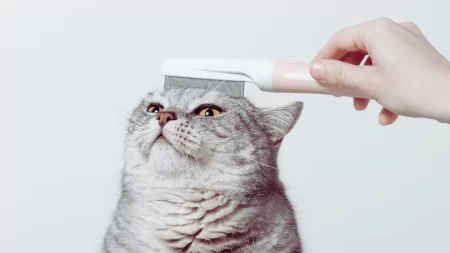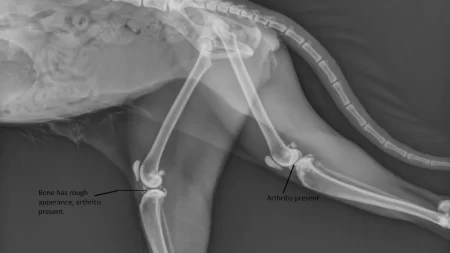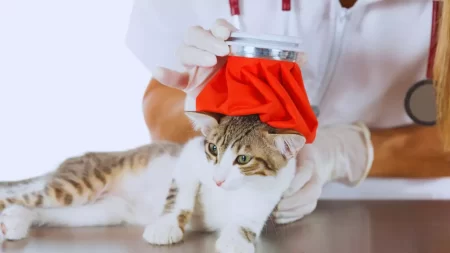Do you adore your furry feline friend? But, did you know that they can get infected with roundworms? It’s essential to know the signs and how to prevent this parasite.
To protect your cat, learn more about how roundworms can infect cats. Also, find out what you can do to keep them safe.
Roundworms (feline Toxocara cati or feline ascarids) are parasites that infect cats. They are white, round, and up to several inches long. They can be seen in fresh cat feces or vomit. Roundworms live in the small intestine and cause vomiting, weight loss, and anemia. They consume lots of nutrients from their hosts, leading to dehydration.
Cats can get roundworms from eating contaminated rodents, their mother’s milk, or fleas with infected eggs.
Humans can get roundworms too. Contact with soil containing the eggs can cause abdominal pain, nausea, fatigue, and coughing. If not treated, there is a risk of blindness due to larval migration. Thankfully, infection in humans is rare if basic hygiene is followed.
It’s important for cats to get regular deworming treatments from a vet. Contamination in outside areas should be prevented, to keep humans safe from these parasites.
How Roundworms Infect Cats?
Roundworms are a type of parasitic worm that can affect cats of all ages. These parasites can be contracted in many ways. Knowing the life cycle and symptoms will help protect your cats.
Roundworms are found in the environment. Cats may come into contact with contaminated soil or feces, or with an infected animal like a mouse or bird. This allows the larvae to migrate and cause infection. Symptoms include vomiting, diarrhea, and weight loss. If left untreated, organs and other systems can be damaged.
To prevent roundworm infections:
- Keep cats inside;
- Deworm regularly;
- Properly dispose of waste;
- Vaccinate against parasites;
- Clean up toys regularly;
- Give preventive medications prescribed by your vet;
- Practice good hygiene when handling pets or waste.
Symptoms of Roundworm Infection in Cats
Roundworms are a common and dangerous parasite for cats. Toxocara canis and Toxascaris leonina are two types of roundworms that can infect cats. Symptoms of infection may not be obvious. But, some signs include:
- diarrhea and/or vomiting
- previously undiagnosed weight loss or poor growth rate
- dull hair coat
- distended abdomen
Roundworms may be visible in a cat’s stool or vomit. They look like spaghetti or small whitish-colored segments that move.
It is essential to bring kittens to the vet for regular physical exams and fecal tests. If your cat has an active infection, the vet may suggest deworming medications. These medicines can be taken orally or topically. Feline Panacur® C and other treatments may be prescribed to eradicate the condition.
To prevent infestations, good hygiene is key. Clean the litter box and dispose of fecal matter properly. Feed your cat high-quality food and check outdoor areas for contamination. Keep strays and rodents away from your home. Lastly, get regular fecal exams for all house pets, both indoors and outdoors.
Causes of Roundworm Infection in Cats
Cats can get infected with roundworm by coming into contact with contaminated soil or dirt on their fur. This can be tracked through a litter box. Infected mothers can pass larvae to their kittens through their milk.
Outdoor cats are more at risk since they come into contact with contaminated soil, water sources, and potential prey animals more often than indoor cats. Fleas can also carry roundworm larvae, as well as infected rodents, earthworms, slugs, and other animals.
Diagnosis of Roundworm Infection in Cats
When a roundworm infection is suspected in cats, a fecal exam should be conducted. The fresh stool is collected for analysis under a microscope. This will indicate if there is an infection. Additional testing may be required to determine the type of roundworm infection. These tests could include antibody testing, x-rays, ultrasound imaging or biopsies. Anesthesia may be needed. Your veterinarian will decide which methods are suitable for diagnosing and treating the roundworm infection.
Treatment of Roundworm Infection in Cats
Roundworms, also known as nematodes, are intestinal parasites. They cause serious health issues for cats. Their life cycle is 4-6 weeks and they can infect cats of any age. Contaminated soil, infected rodents, or even mother cats to their kittens via the placenta, can cause infection.
Diarrhea, vomiting, and weight loss are common signs. Treatment involves deworming with a broad-spectrum anthelmintic medication. Follow your vet’s directions carefully when administering treatment. Re-treatment may be necessary after initial treatment, depending on severity.
Good sanitation techniques are important too. Wear protective gear when handling feces, dispose of litter boxes daily, disinfect surfaces, and wash pet bedding in hot water every week.
Most medications are effective against roundworms but speak to your vet about potential risks before giving any treatment to your cat.
Prevention of Roundworm Infection in Cats
Roundworm infections in cats are common. But, you can help protect your cats by following prevention and management guidelines. Cats become infected in two ways: through environmental exposure, and from the mother-kitten transmission.
Environmental exposure occurs when cats come into contact with contaminated soil, feces, or water. To reduce risk, limit access to untreated outdoor soil. Always clean up after your cat has used the litter box. Pick up a stool directly, not scooping up fecal material while it is still in the box. Larvae can survive during the scooping process. If already infected, dewormer medication prescribed by a veterinarian will be necessary to remove them.
Mother-kitten transmission occurs when young kittens ingest worm eggs contained in their mother’s milk or feces. To minimize this risk, cats should receive regular veterinary checkups. Preventive treatments for worms, as recommended by a veterinarian, should be given throughout their lives. Effective treatments include:
- An oral medication monthly
- An injection every three months, depending on the product.
Conclusion
Good hygiene and proper care can prevent roundworm infections in cats. Keep the area clean and give your cat regular deworming treatments as part of regular prevention. If you suspect an infection, speak with your veterinarian. These steps protect cats and their owners.
If signs or symptoms of roundworm infection are noticed, seek medical attention quickly for the best chance of restoring your pet’s health.




![How Do Roundworms Infect Cats? [Explained] how do roundworms infect cats](https://justcatlover.com/wp-content/uploads/2023/02/how-do-roundworms-infect-cats-1024x576.jpg)


